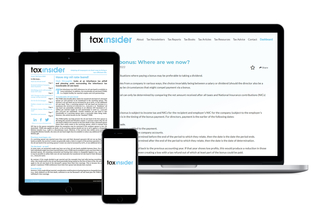 Mark McLaughlin points out that a tax avoidance arrangement involving dividend payments towards university fees is under attack from HMRC.
Mark McLaughlin points out that a tax avoidance arrangement involving dividend payments towards university fees is under attack from HMRC.
----------------------
This is a sample article from our tax saving newsletter - Try Tax Insider today.
---------------------
In family and owner-managed companies, it is not uncommon for shares in the company to be spread among family members. This might be done for various reasons – both tax and non-tax related.
For example, the company’s shareholders might include an adult child whose parents control the business, or a trust in which the child is the beneficiary. Dividends might be paid on those shares, which go towards the child’s university fees and expenses.
There is nothing inherently wrong with dividends being paid and used in this way. However, HM Revenue and Customs (HMRC) has highlighted a marketed planning arrangement around dividends and school fees, which is considered to represent abusive tax avoidance.
Don’t go there!
In June 2023, HMRC published its Spotlight 62 ‘Dividend diversion scheme used to fund education fees’ (https://tinyurl.com/y3c8zw2v).
Briefly, the scheme involves a company issuing a new class of shares. A family member (usually a grandparent of the students, or a sibling of the company owner) purchases the new shares for an amount significantly below market value. The family member usually gifts the shares to a trust or declares a trust over the shares for the benefit of the company owner’s children. The company’s shareholders then vote for substantial dividend payments in respect of the new class of share, which is paid to the trustees. The company owner’s children (as the beneficiaries of the trust) are entitled to the dividend.
The dividends are taxable income of the company owner’s children. However, the children pay much less tax than if the company owner had received the dividend (i.e., due to the children’s tax-free personal allowance (£12,570 for 2023/24), £1,000 dividend allowances and eligibility to the dividend basic tax rate).
HMRC considers that this scheme (or similar arrangements) does not work due to the ‘settlements’ anti-avoidance legislation, which would have the effect of treating the dividends as income of the parents, as opposed to the children.
Wider scope?
Whilst Spotlight 62 is targeted at a specific, marketed tax scheme, HMRC will no doubt be looking at other companies in which the shares are spread among family members including trust arrangements for the owner-manager’s children, where dividends are paid on the company’s shares.
HMRC’s Trusts, Settlements and Estates manual (at TSEM4325) lists several factors among those that might be susceptible to challenge under the settlements provisions. Those factors include:
-
disproportionately large returns on the amount paid for the shares;
-
differing classes of shares (i.e., so-called ‘alphabet’ shares) enabling dividends to be paid only to shareholders paying lower rates of tax;
-
income being transferred from the person making most of the profits of a business to a friend or family member who pays tax at a lower rate; and
-
dividends are paid only on certain classes of shares.
Of course, there are many family companies in existence that pay dividends, including to (or for) adult children towards university fees, etc. It does not follow that such arrangements are automatically ‘caught’ by the settlements anti-avoidance rules. However, a review by a tax expert in this field may be prudent.
Practical tip
Company owners who receive a ‘nudge’ letter from HMRC about their potential use of Spotlight 62 or similar arrangements should seek professional advice about how to deal with them.



